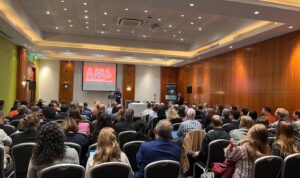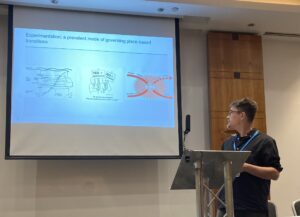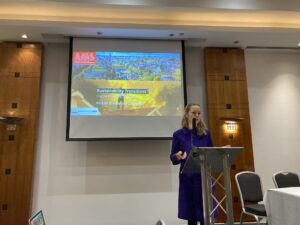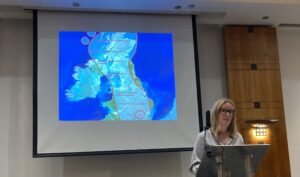Regional and urban sustainability transitions was the theme of the 2022 RSA Winter conference, set at the Holiday Inn in Bloomsbury, London, after a two-years break due to the pandemic. Sustainability transitions is a term used to describe the radical and structural shifts in socio-technical and socio-ecological systems that need take place to overcome the multiple barriers for moving towards more sustainable futures.

Given the growing geopolitical instability, the ongoing pandemic, deepening political polarisation, accelerating climate change and migration pressures, the challenge of enabling those transitions in cities and regions is even more urgent and complex. While we see many emerging innovations and novel policy approaches to drive sustainability transitions, these – often experimental approaches such as living labs – seldom lead to upscaling of solutions and knowledge production while ‘business as usual’ approaches dominate. In addition, inter- and intra-regional disparities make progress towards sustainability transitions deeply uneven, while sustainability policies are increasingly polarising societies and trigger further discontent in places that are already economically disadvantaged and less resilient to changes and adaptations.
Opening the debate with three leading scholars
The opening plenary set the scene for many debates during the RSA Winter Conference, bringing together three leading scholars working on transitions: Lars Coenen (Western Norway University of Applied Sciences); Eveline Van Leeuwen (Wageningen University); and Joanna Williams (University College London).
Structure and capacity to learn from policy “experiments”
Lars kicked of the discussion by exploring the challenges of managing sustainability transitions. He stresed difficulties in addressing wicked problems that climate change brings and in ensuring capacity to steer change across different regions and cities. Lars argued that currently most cities and regions wishing to accelerate sustainability transitions engage in experimentation, for instance through living labs, and that approach has its limits. In fact, not only may we lack time to experiment, given how climate change is speeding up, but also such local experimentation seldom leads to upscaling of innovations that could drive a more systemic shift. What is needed, according to Lars, is a more structured approach to drive far-reaching social, institutional, and cultural change away from the current unsustainable paradigm and we need to develop capacity to learn from policy experiments.

Transitions to a circular economy
Following up on this, Eveline shifted the focus towards an increasingly important theme in sustainability transitions, namely a shift towards circular economy. The latter entails moving away from a linear economic system – where materials are extracted, then products made, used, and, finally discarded – towards one in which waste generation would be reduced, waste is used a resource for economic activities and a regenerative and restorative system of production and consumption, which closes the input and output cycles of the economy is developed. She pointed out that sustainability, paradoxically, is neither as integrated into the implementation of circular economy strategies in regions and cities nor in research on circularity as it should be.
Transitions to a circular economy will have profound social-ecological implications, going beyond growth, technology, and market-based solutions, eventually leading to the emergence of what we may call a circular society. Such a massive change is not possible without the commitment and participation of all societal actors. To get a grip on those we need to find new ways to measure progress towards circular futures that can capture the complexity of the ‘metabolism’ of cities and regions and provide insights into the distribution of benefits and burdens of the transition across different groups and territories.

Rebalancing the relationship between cities and their hinterlands
This line of argument was then further elaborated by Joanna who shed more light on the challenge of pushing cities and regions towards circular development, requiring a move away from market logic to an eco-logic. Joanna argued how currently cities are in a parasitic relation with their hinterlands providing the city dwellers and economic actors within them with resources, whereas we need to rebalance that relationship when planning for a transition towards circular economy and adopt a regenerative lens on ecosystem restoration in cities and around them. This new paradigm would be based on three types of actions: looping actions, aiming at closing material loops; ecologically restorative actions, aiming at regeneration of degraded ecosystems and provision of ecosystem services; and adaptive actions emphasizing ability to learn and adjust in the face of uncertainty and external shocks. In this, as Joanna argued, we need to make sure that these actions are localized to take advantage of proximity, boost local economies, reduce the emissions from transportation, and engage the local communities to help develop local social and human capital and community resilience.
Achieving this goal, however, brings a host of practical challenges. First of those relates to adopting a regenerative lens in spatial planning and ensuring effective coordination of activities aimed at promoting circularity across geographical scales. The second challenge concerns governance and politics: is there capacity to drive such shifts at the regional scale, connect actions and strategies across administrative boundaries and engage the relevant stakeholder in this? Finally, there is the data challenge: do we have the means and adequate metrics to monitor progress towards regenerative regions and cities?

Leaving no one behind
The session closed with a debate on the challenges for sustainability transitions in cities and regions. The most urgent one concerned addressing the specific handicaps that the so-called ‘left behind places’. Such regions were neglected for decades, which resulted in growing discontent and disillusionment with democracy. Their economies often rely heavily on energy-intensive industries that are currently being phased out are set to loose out from sustainability transitions, whereas leading cities and regions have more capacity to and deploy sustainable innovations more rapidly.
How can we make sure that the stakeholders and citizens in declining regions accept the challenges of transitions and are given agency in this process? How can we ensure a fairer distribution of benefits and burdens across diverse territories and avoid that sustainability transitions deepen the inter- and intra-regional disparities? How to best develop capacity to manage the transition process, especially in places where institutions remain weaker and the society resists change? Who is the transition for and how to co-create strategies and policies for enabling this shift together with citizens, including those from groups which are currently at the margin of that debate? And finally, how can trigger learning and knowledge transfer between cities and regions, bearing in mind the pitfalls of copy-pasting policy solutions from one place to another without considering the specificities of the regional contexts?
These questions point to a set of knowledge gaps that can be RSA community is best suited to bridge.
Adding to the debate?
The Regional Studies Association’s Annual Conference 2023 #RSA23 is being held in partnership with the
School of Economics and Business, University of Ljubljana, Slovenia. This four-day conference brings together
academics and policymakers to exchange news, views and research findings from the fields of regional studies
and science, regional and economic development, policy and planning.
Transforming Regions presents a timely opportunity to discuss and debate these important issues. Regional research has a key role to play in revealing the opportunities, impacts and challenges of these transitions on people and places. The conference will also direct attention towards seeking to improve the “what” and “how” of regional policies and planning, ensuring transitions deliver for people and places.
More information on the upcoming 2023 conference can be found here.

Marcin Dąbrowski Researches and teaches spatial planning, climate change adaptation, citizen engagement, and circular economy in cities and regions in Department of Urbanism, Delft University of Technology, Netherlands.
Are you currently involved with regional research, policy, and development? The Regional Studies Association is accepting articles for their online blog. For more information, contact the Blog Editor at rsablog@regionalstudies.org.